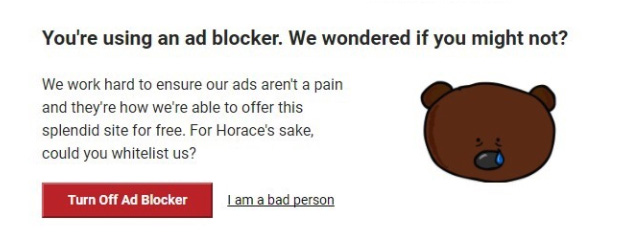Updated 28/10/2020
On one of our recently recorded podcasts we discussed our marketing pet peeves. My choice was a new marketing approach called ‘confirm shaming’ in which the user of a website is offered a choice, and if they decline the button option is accompanied by a snarky reply as below:
 This is an amusing attempt to influence user behaviour towards choosing the affirmative option. The image shows a number of coercive techniques: making the confirmation button a vibrant red colour( and very clearly a button compared to the negative response), the use of a cuddly cartoon bear to instill empathy, and informal language.
This is an amusing attempt to influence user behaviour towards choosing the affirmative option. The image shows a number of coercive techniques: making the confirmation button a vibrant red colour( and very clearly a button compared to the negative response), the use of a cuddly cartoon bear to instill empathy, and informal language.

